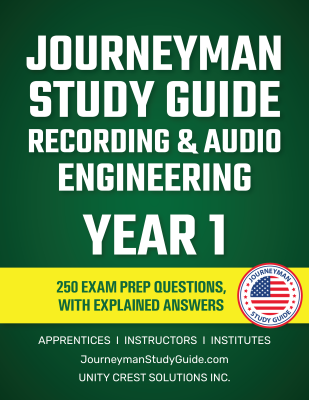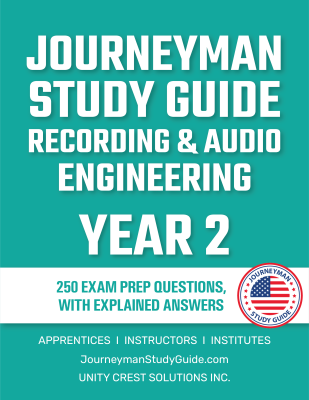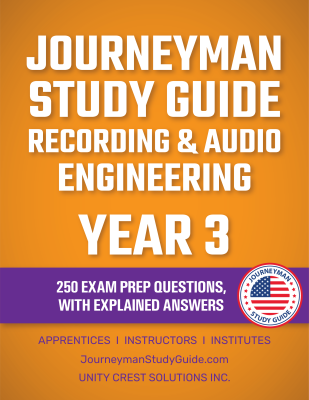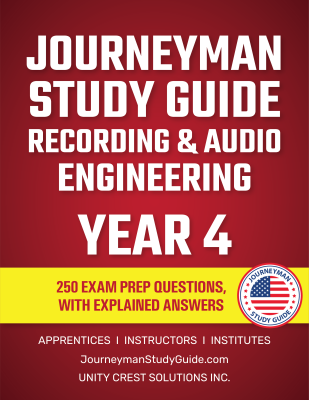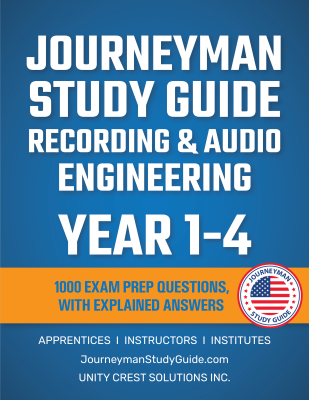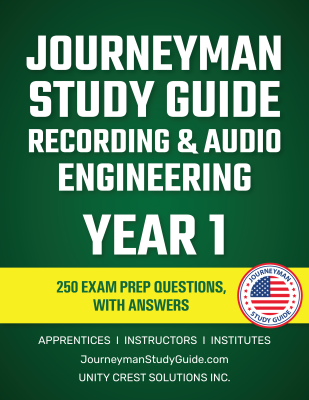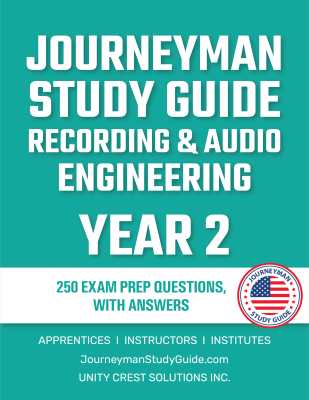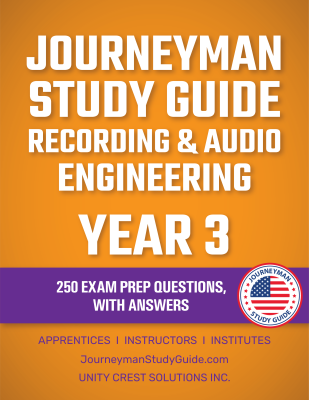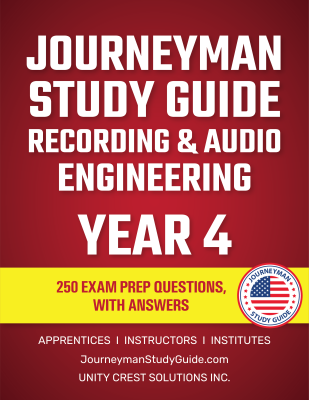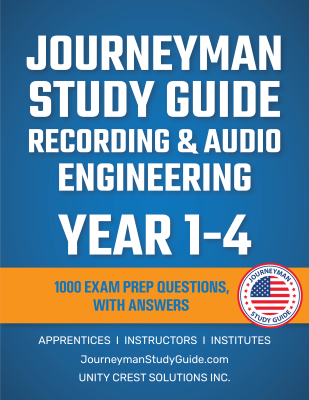Questions, Answers, & Explanations
Get clear explanations behind every answer, perfect for deeper learning and more thorough exam preparation.
Site Updates in Progress: Things might look different as we work on enhancing your experience.
Recording and audio engineering is a specialized field focused on capturing, mixing, and producing high-quality sound recordings for various media formats. Whether it's for music, film, television, video games, or live performances, audio engineers ensure that sound is recorded, edited, and mixed to perfection. This trade combines technical expertise with creative vision, as audio engineers work closely with artists, producers, and other technical personnel to deliver a polished sound product.
What Does a Recording & Audio Engineer Do?
A recording and audio engineer plays a crucial role in the music and entertainment industry. They are responsible for capturing sound, whether it's from instruments, vocals, or other sound sources, and ensuring that the recording process runs smoothly. Their tasks include setting up microphones, operating recording equipment, and adjusting sound levels to ensure optimal sound quality. Once the recording is complete, the engineer's work continues as they edit and mix the tracks to produce the final sound product.
In addition to music production, audio engineers also work on sound for films, television, radio, and live events. They ensure that audio is clear, balanced, and well-integrated with visuals, creating an immersive experience for the audience. In live sound engineering, for instance, they manage sound systems at concerts or events, ensuring the sound is delivered to the audience without distortion or imbalance.
Skills and Knowledge Required
To succeed as a recording and audio engineer, you must develop a solid foundation of technical and artistic skills. Key skills include:
Work Environment
Recording and audio engineers work in a variety of settings, including recording studios, post-production houses, concert venues, and live event locations. Studios may be located in dedicated facilities for major labels or independent setups for smaller projects. Some engineers even work on location, traveling with bands or productions to capture sound for live recordings or on-location audio recording.
The hours for an audio engineer can vary widely depending on the project. Studio sessions may run long, especially during the mixing and editing phases. Similarly, live sound engineers must be available during event times, which can include evenings and weekends.
Career Path and Opportunities
There are several career paths within the recording and audio engineering industry. Many audio engineers begin as assistants or interns at recording studios, learning the trade by working alongside more experienced professionals. Over time, they may advance to positions such as head engineer, mixing engineer, or mastering engineer.
Some audio engineers choose to specialize in specific areas, such as sound for film or television, game audio, or live event sound. Others may pursue freelance work, where they have the opportunity to work with a variety of clients across different industries.
The demand for skilled audio engineers is expected to remain strong, particularly in the music, film, and entertainment sectors. Technological advancements, such as the growing use of digital audio, have made audio engineering more accessible and allowed for new career opportunities in the industry.
Conclusion
Recording and audio engineering is a dynamic and rewarding trade that combines technical skill with artistic creativity. Whether you're working in a studio, on a film set, or at a live concert, audio engineers are essential to the production of high-quality sound recordings. If you have a passion for music, technology, and sound, a career in audio engineering may be a perfect fit for you.
The Recording & Audio Engineering exam is an essential step in becoming a certified professional in the field of audio production. The exam tests your knowledge, skills, and abilities to handle various technical aspects of sound recording, mixing, and editing. Passing this exam demonstrates your proficiency in the trade and opens doors to job opportunities in recording studios, live events, television, film, and more.
Structure of the Exam
The Recording & Audio Engineering certification exam is typically divided into multiple sections, each focusing on a different aspect of the field. The exam is designed to assess both theoretical knowledge and practical skills. It may include multiple-choice questions, practical tests, and written assessments.
Exam Topics
The Recording & Audio Engineering exam covers a broad range of topics that are essential for a successful career in audio engineering. Key areas of focus include:
Format of the Exam
The format of the Recording & Audio Engineering exam may vary depending on the certifying body, but it generally includes the following components:
Preparation for the Exam
To pass the Recording & Audio Engineering exam, it is essential to be well-prepared. Here are some strategies to help you succeed:
Conclusion
The Recording & Audio Engineering certification exam is a comprehensive test that assesses both your theoretical knowledge and practical skills. By studying key topics such as sound theory, equipment, signal flow, and mixing, you will be well-prepared to succeed on the exam. With proper preparation and hands-on experience, passing the exam will help you earn your certification and advance your career in the dynamic field of audio engineering.
The Recording & Audio Engineering certification exam evaluates your understanding of essential concepts and your ability to apply them in real-world scenarios. To help you prepare, it’s crucial to know the types of questions you will encounter and how to approach them. The exam will cover a range of topics, from sound theory to equipment handling, and will test your practical skills in both studio and live sound environments.
Types of Questions
The exam questions for Recording & Audio Engineering are typically divided into several categories:
These questions are designed to test both your theoretical knowledge and practical application of audio engineering techniques. Here's a breakdown of what you can expect in each section:
1. Multiple-Choice Questions
The multiple-choice section will test your understanding of the fundamental principles of audio engineering. The questions will focus on topics such as:
2. Practical Scenario-Based Questions
Practical scenario-based questions test how you would apply your knowledge in a real-world setting. These questions simulate situations you might face on the job, such as recording a band, troubleshooting technical issues, or mixing a track. Example questions might include:
These questions assess your ability to diagnose and resolve audio-related problems, as well as how you approach common challenges faced during recordings or live events.
3. Short Answer or Written Response
The written response section may ask you to provide detailed explanations of certain techniques or principles. You might be asked to describe a specific process, such as mixing or mastering, or to explain why a particular piece of equipment is used in certain scenarios. Example questions could include:
These questions test your ability to clearly articulate your understanding of audio engineering concepts and techniques. Your answer should demonstrate a deep knowledge of the processes and your ability to apply them in practical situations.
How to Prepare for the Exam
To do well on the Recording & Audio Engineering exam, it’s important to:
Conclusion
The Recording & Audio Engineering exam is designed to assess your ability to apply technical knowledge and problem-solving skills in the field.
A career in recording and audio engineering offers a dynamic and fast-paced environment, where no two days are exactly the same. Whether you are working in a studio, at a live event, or in post-production, the role of an audio engineer requires both technical skills and creativity. Here’s an overview of what a typical day might look like for a recording and audio engineer in the USA.
Morning: Preparing for the Day
A typical day for a recording and audio engineer starts with preparation. If you’re working in a recording studio, you’ll likely begin by reviewing the day’s schedule. This may include a list of artists or bands coming in for recording sessions or a list of tracks that need mixing or editing. It’s important to be organized, as time in the studio is often limited, and efficient use of time is key to a successful session.
You’ll also check your equipment to make sure everything is in working order. This may involve testing microphones, checking audio interfaces, and ensuring that your digital audio workstation (DAW) is set up properly. If you're working in a live sound setting, you may spend some time preparing the sound system for an upcoming event, ensuring that all speakers, microphones, and mixers are in place and functioning correctly.
Mid-Morning: Setting Up for Recording
Once you’ve prepared, it’s time to begin the day’s tasks. If you’re recording a band or artist, the first part of your day will involve setting up the microphones and instruments in the studio. You’ll position microphones for different instruments, taking into account factors like acoustics and the artist’s preferences. If the session involves multiple instruments or vocalists, you’ll need to make sure that each element is captured clearly.
After the setup, you’ll run through some test recordings to ensure the levels are correct and that there is no distortion or unwanted noise. You’ll likely adjust levels on the mixing console, checking for balance between the instruments and vocals. During this time, you’ll also be communicating with the artist or band to ensure their needs are met, making adjustments to the sound as needed.
Afternoon: Recording and Mixing
As the recording session begins, your role becomes more focused on managing the session. You’ll be responsible for ensuring that the recording equipment runs smoothly, making adjustments to levels as needed, and troubleshooting any technical issues that arise. The artist will likely record several takes of each song, and your job is to ensure that the best performance is captured.
Once the recording is done, the next phase is mixing. This involves adjusting individual tracks to create a balanced and cohesive sound. You’ll work with the artist or producer to make creative decisions about the sound, such as adding effects or adjusting the EQ on certain tracks. Mixing is a time-consuming process that requires patience and a good ear for detail. You’ll spend a significant amount of time listening to the tracks, adjusting levels, and experimenting with different sounds to achieve the desired result.
Late Afternoon: Final Edits and Mastering
After the recording and mixing process, your day might shift to editing and mastering. Editing involves cleaning up the tracks, removing unwanted noise, and making sure the timing of each element is perfect. This may include adjusting the timing of certain instruments or adding fades to prevent abrupt starts or stops in the audio.
Mastering is the final step in the process, and it’s all about preparing the track for distribution. You’ll ensure that the track sounds polished and consistent across different formats and playback systems. Mastering might include adjusting the overall volume, adding a bit of compression, or fine-tuning the frequency response of the track.
If you’re working on a live event, the late afternoon might involve sound checks, adjusting microphones and speakers, and ensuring that everything is set up for the evening’s performance. In this scenario, you might spend the last few hours before the event making final adjustments and running through the sound system to ensure everything is clear and balanced.
Evening: Wrapping Up
As the day winds down, you’ll wrap up the session by backing up all of the recorded files, making sure they are safely stored for future use. If you’re working with a client, you’ll go over the progress made that day and schedule any follow-up work, such as additional recording sessions or mixing time. If the project is nearing completion, you may deliver the final mix to the client.
If you’re working on a live event, your evening will likely end with the performance itself. Throughout the event, you’ll be in charge of ensuring that the sound is consistent and clear for the audience. You’ll adjust levels during the performance, troubleshoot any technical issues, and communicate with the performers and crew to ensure everything runs smoothly.
A career in recording and audio engineering can be highly rewarding, offering a range of opportunities in the music, film, television, and live event industries. As a recording and audio engineer, you can choose from various career paths, each with its own challenges and rewards. The field is dynamic, and with the right training and experience, there are many ways to advance and specialize in different areas of audio production.
Entry-Level Positions
Starting your career in recording and audio engineering often begins with an entry-level position. Many aspiring engineers begin their careers as audio assistants or interns in recording studios, post-production houses, or live sound companies. These roles provide hands-on experience, where you can learn the basics of audio equipment, signal flow, and the overall production process.
As an assistant, you may be tasked with setting up equipment, handling basic recording tasks, or troubleshooting technical issues. This is an excellent opportunity to gain practical experience while working alongside more experienced engineers, producers, and artists. Internships or entry-level roles can also help you build a professional network, which is essential in the competitive audio engineering industry.
Mid-Level Positions
After gaining some experience and learning the ropes, you may be able to move into a mid-level position such as a recording engineer or mixing engineer. In this role, you’ll take on more responsibility, working on actual recording sessions, mixing tracks, and interacting with artists, producers, and other team members.
A recording engineer is responsible for capturing the sound during recording sessions. You’ll need to be proficient in setting up microphones, adjusting levels, and ensuring the recording process runs smoothly. If you work in a studio, this could mean recording everything from vocals to instruments for music albums, voiceovers for films, or sound effects for video games.
As a mixing engineer, you will work on the post-production side of things, taking raw audio recordings and blending them together to create a polished sound. This includes adjusting levels, panning, adding effects, and ensuring that all elements of the track are balanced and cohesive. Mixing engineers are often highly creative, as they play a key role in shaping the overall sound of a production.
Specialization and Advancement
Once you have gained experience as a recording or mixing engineer, you may choose to specialize further. The field of audio engineering is vast, and many engineers go on to focus on specific areas of the industry. Some of the common specializations include:
Senior-Level Positions
As you continue to gain experience and develop your expertise, you may progress to a senior-level position such as a chief engineer or head of audio production. These roles involve overseeing audio teams, managing large projects, and ensuring that the audio production process runs smoothly from start to finish.
In a senior role, you will be expected to have a comprehensive understanding of all aspects of audio engineering, including recording, mixing, mastering, and live sound. You may also be involved in budget management, client relations, and business development. If you work for a recording studio or production company, you might eventually manage the entire audio department.
Freelancing and Entrepreneurship
Many recording and audio engineers choose to pursue freelance work, where they work independently on a variety of projects. As a freelancer, you can choose which clients and projects to take on, whether it’s working with indie bands, creating sound effects for video games, or mixing sound for film productions.
Freelancing offers flexibility but also requires strong business skills, as you will need to manage your own marketing, finances, and client relationships. Some audio engineers also go on to start their own recording studios, live sound companies, or post-production houses, creating opportunities for growth and the ability to shape their own career paths.
Conclusion
A career in recording and audio engineering can be incredibly rewarding, with opportunities to work in many exciting industries. Whether you start as an assistant, specialize in mixing or live sound, or move up to senior-level positions, there are many paths for advancement and specialization. With dedication, hard work, and a passion for sound, you can build a successful career as a recording and audio engineer.
A career in recording and audio engineering can be financially rewarding, but salaries can vary widely depending on experience, location, and the type of work you do. Whether you work in a studio, handle live sound for events, or specialize in post-production audio, the wage expectations for audio engineers differ based on these factors. Below is a breakdown of the wage expectations for recording and audio engineers in the USA.
Entry-Level Salaries
For those just starting out in the field, salaries can range from $30,000 to $45,000 per year. Entry-level positions such as audio assistant or intern in recording studios or live sound companies typically offer lower pay as you gain experience. These positions often involve long hours of hands-on work, but they provide valuable learning opportunities that can help you move up in your career.
At the entry level, many engineers also work on a freelance basis, which means income can fluctuate depending on the availability of work. Freelancers may not have a steady paycheck but can often earn more per project, depending on their skill level and the scope of the work. While entry-level salaries may not be high, they offer a good foundation for building a career in audio engineering.
Mid-Level Salaries
Once you have gained some experience and moved into a mid-level position, such as a recording engineer or mixing engineer, your earning potential increases. Mid-level audio engineers can expect to earn between $45,000 and $70,000 annually. This salary range reflects engineers who have several years of experience and can handle their own recording or mixing sessions with minimal supervision.
For those working in post-production audio, such as sound designers or dialogue editors for film and television, salaries can be similar or even higher, depending on the complexity of the projects. Engineers who specialize in post-production audio for movies, video games, or commercials may earn salaries at the higher end of this range due to the highly specialized nature of the work.
Experienced and Senior-Level Salaries
Experienced audio engineers with a strong portfolio and a wide range of skills can expect to earn $70,000 to $100,000 or more. Senior-level positions, such as head engineer or audio director, offer higher salaries, particularly for those working at major recording studios, production companies, or large live event companies. These roles come with greater responsibilities, including managing teams of engineers, overseeing large-scale audio productions, and working with high-profile clients.
Senior-level engineers who have extensive experience and a proven track record in high-demand fields like film or game audio may earn salaries well above $100,000 per year, particularly if they are involved in high-budget projects or working in large markets like Los Angeles or New York City.
Freelance and Self-Employed Audio Engineers
Freelance recording and audio engineers have the potential to earn a wide range of incomes. Some freelancers charge on a per-project basis, while others may charge hourly rates. Freelance audio engineers can earn anywhere from $25 to $150 per hour, depending on their level of experience and the type of work they are doing. For instance, mixing or mastering high-profile albums could command rates toward the higher end, while freelance work on smaller projects might be on the lower end of the spectrum.
Freelancing allows for flexibility and the ability to work with a diverse range of clients. However, income can fluctuate significantly, especially early on, as you build a reputation and client base. Freelancers often have to manage their own business expenses, marketing, and taxes, which can impact their take-home income.
Location and Industry Impact
Location is a key factor in determining salary. Audio engineers in major cities with high concentrations of entertainment and media industries, such as Los Angeles, New York, Nashville, and Chicago, tend to earn higher salaries. These cities are home to large recording studios, live venues, and post-production houses, where the demand for skilled engineers is high. In contrast, engineers working in smaller markets or rural areas may earn less, but the cost of living may also be lower.
The industry you work in can also impact your earning potential. For example, live sound engineers working at concerts and festivals may earn slightly less on average compared to studio engineers working on music albums. However, engineers who specialize in highly lucrative industries, such as film, television, or video games, often earn higher wages due to the technical skills required and the high budgets of these productions.
Additional Benefits and Perks
In addition to salary, many recording and audio engineering jobs come with benefits such as health insurance, retirement plans, and paid time off. These benefits are more common for full-time employees in large studios or production companies. Freelancers, however, typically need to arrange their own benefits and insurance, which can be costly.
Many engineers also receive bonuses for successful projects, especially in the film, television, and video game industries. These bonuses can add a significant amount to your overall earnings.
Conclusion
The wage expectations for recording and audio engineers in the USA vary depending on experience, location, and industry. Entry-level positions typically earn between $30,000 and $45,000 annually, while mid-level engineers can earn between $45,000 and $70,000. Experienced engineers and those in senior roles can expect to earn $70,000 or more, with the potential for significant earnings in high-demand areas like film or game audio.
Recording and audio engineering relies heavily on specialized tools and resources to ensure high-quality sound production. Whether you’re recording music, editing audio for film, or working on live sound, the right equipment and software are crucial to achieving professional results. This section will explore the essential tools and resources for audio engineers in the USA.
Essential Tools for Recording & Audio Engineers
Resources for Audio Engineers
In addition to tools, there are several resources available to help audio engineers stay current with industry trends, improve their skills, and find solutions to common challenges.
A strong education is essential for anyone looking to pursue a career in recording and audio engineering. The right educational programs provide both the technical knowledge and hands-on experience needed to succeed in this dynamic field. In the USA, there are many options available, ranging from certificate programs to full degree courses, each offering unique opportunities for learning. In this section, we’ll explore the different types of education programs, how to choose the right one, and some of the top institutions that offer training in recording and audio engineering.
Types of Educational Programs
Choosing the Right Education Program
When selecting an education program in audio engineering, it’s important to consider several factors:
Top Institutions Offering Education in Audio Engineering
Several schools in the USA are known for offering top-tier education in recording and audio engineering. Some of the best institutions include:
In the recording and audio engineering field, unions and employers play crucial roles in ensuring fair working conditions, job security, and opportunities for career advancement. Whether you're just starting in the industry or looking to advance in your career, understanding the role of unions and employers can help guide your career path. This section will explore the role of unions and employers in the recording and audio engineering industry in the USA.
Unions in Recording & Audio Engineering
Unions are organizations that represent the collective interests of workers, providing members with various benefits, including access to job opportunities, fair wages, and workplace protections. In the recording and audio engineering industry, unions advocate for workers’ rights and help negotiate terms for better working conditions and pay.
One of the primary unions for audio engineers is the International Alliance of Theatrical Stage Employees (IATSE). While primarily known for representing workers in theater and film, IATSE also covers live sound engineers, technicians, and other audio professionals who work in live events, concerts, and theater productions. This union ensures that audio engineers working in live settings have fair wages, safe working conditions, and job security.
Another significant union is the American Federation of Musicians (AFM), which represents musicians, but also includes recording engineers in its membership. AFM negotiates contracts with recording studios, music labels, and other employers in the music industry. Membership in the AFM can provide audio engineers with access to unionized recording sessions and a strong network of industry professionals.
Being part of a union can offer many benefits, including:
Employers in Recording & Audio Engineering
Employers in the recording and audio engineering industry range from large recording studios to small, independent production companies and live event companies. Audio engineers can work for major entertainment companies, post-production houses, and in live sound settings such as concert venues and theaters. Employers play an important role in shaping the career paths of audio engineers, providing access to industry-standard equipment, mentoring, and opportunities for growth.
Major Employers
Freelance Work
Freelancing is common in the audio engineering industry. Many engineers prefer the flexibility and variety of working as independent contractors. Freelance audio engineers work on a wide range of projects, from recording albums to providing live sound for events and mixing sound for television and film.
Freelancers are often responsible for finding their own clients and projects. While freelancing offers a great deal of independence, it also means that engineers must handle their own business affairs, including marketing, invoicing, and managing their own taxes. Freelancers can join agencies or networks that help them find work and connect with potential employers.
Small and Independent Studios
In addition to large studios and employers, many audio engineers work for smaller, independent recording studios or as part of smaller teams for freelance production houses. Independent studios often offer a more intimate, hands-on working environment, allowing engineers to have more control over projects and work closely with clients. These studios may focus on specific genres of music or types of sound engineering, such as post-production or audio for video games.
Finding Employment in the Industry
When it comes to finding work in recording and audio engineering, networking is key. Many engineers start by interning or working in entry-level positions at recording studios, live event companies, or post-production houses. These positions often lead to more advanced roles as engineers gain experience.
Job boards and online platforms like SoundBetter, Mandy.com, and LinkedIn are also excellent resources for finding freelance and full-time audio engineering opportunities. Networking at industry events, such as conferences, workshops, and trade shows, can help you connect with potential employers and collaborators.
Conclusion
Unions and employers both play significant roles in shaping the career opportunities available to audio engineers. Unions provide workers with collective bargaining power, job security, and training, while employers offer opportunities for growth and hands-on experience in a variety of settings, from large recording studios to live events.
Recording and audio engineering is a rapidly evolving field that requires professionals to stay current with technological advancements, industry trends, and new techniques. As the demand for high-quality sound in music, film, television, and live events continues to grow, there are numerous opportunities for audio engineers to carve out successful careers. This section will provide insights into the future of the trade, emerging trends, and what aspiring audio engineers can expect as they enter and progress in the industry.
The Future of Audio Engineering
The audio engineering industry is constantly changing, driven by innovations in technology and shifts in media consumption. As technology advances, the tools and techniques available to audio engineers become more powerful and accessible. This presents both challenges and opportunities for professionals in the field.
In the past decade, digital audio workstations (DAWs) have significantly improved, and affordable audio interfaces and microphones have made it easier for individuals to set up home studios. This has democratized the audio production process, allowing aspiring engineers and musicians to create high-quality recordings with relatively low overhead costs. As a result, more people are entering the field, and the industry has become more competitive. However, it also means there are more opportunities for freelance work and independent production.
One of the key shifts in the industry is the increasing demand for audio content in diverse media platforms. Beyond traditional music and film, audio engineers are now working on podcasts, audiobooks, video games, virtual reality (VR), and augmented reality (AR). These fields present exciting new challenges and require audio engineers to adapt and expand their skill sets.
Emerging Trends in Audio Engineering
As the demand for high-quality audio content continues to grow, so do the career opportunities for audio engineers. The industry is broad, offering a range of potential career paths in both the technical and creative aspects of audio production.
Conclusion
The future of recording and audio engineering is full of opportunities and challenges. Emerging technologies like immersive audio, remote collaboration, and AI-driven tools are transforming the industry and creating new career opportunities.
Get clear explanations behind every answer, perfect for deeper learning and more thorough exam preparation.
Quick and easy practice to test your knowledge anytime, anywhere—ideal for simple, on-the-go preparation.

